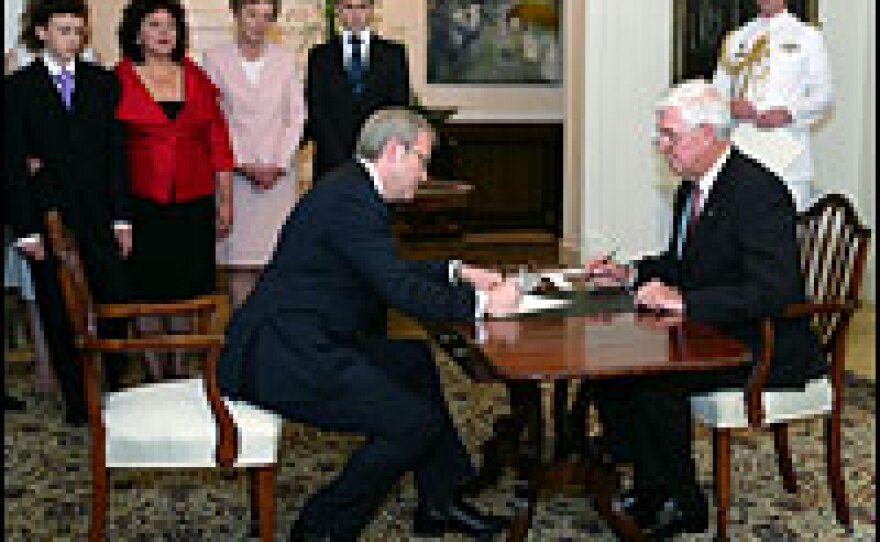
Labor Party leader Kevin Rudd was sworn in Monday as prime minister of Australia, ending the 11-year rule of conservative Prime Minister John Howard.
Howard was one of President Bush's staunchest allies on Iraq — and on almost everything else, as well. Relations between the United States and Australia could change somewhat with Australia's new leadership, especially in the areas of Iraq and climate change.
"He isn't a left-wing radical by any stretch of the imagination," Gerard Henderson, head of the Sydney Institute and a one-time aid of former Prime Minister Howard, says of Rudd. Rather, she says, he comes from the center-right of the Labor Party.
Henderson says that the Labor Party and Rudd himself have "always been supporters of the Australian- American alliance, and that continues. So, Kevin Rudd replacing John Howard won't make any difference in terms of intelligence sharing, forward basing, ship visits, aircraft visits. That will all remain the same."
What will change is the nature of Australia's commitment in Iraq. Rudd has pledged to withdraw 500 combat troops from Iraq, nearly one-third of the total Australian commitment there. But analysts in Australia say the move is largely symbolic.
Hugh White, professor of strategic studies at the Australian National University, says that Rudd will proceed slowly and will negotiate with the United States to minimize the impact on the Iraqi operation.
"Of course, very importantly, he will sustain a significant number, something like 700 or 800 Australian troops, sailors and airmen in Iraq and around Iraq and the gulf region. So it's not as though Australia is leaving the coalition," White says.
Australia is also expected to continue what has been a far more dangerous combat deployment in southern Afghanistan, where three Australian soldiers have been killed in the past few weeks. But that commitment could change, too.
Michael Fullilove, head of the Global Studies Program at the Lowy Institute in Sydney, says that Afghanistan is likely to be the big issue for Australian forces over the next year.
"We haven't tested public opinion as to how Australians would react to larger numbers of casualties than we've suffered to date," Fullilove says.
That test could come sooner than the new prime minister may want, White says. The security situation in Afghanistan is deteriorating, and some allies are wavering on their commitment there, he says. White says that Rudd has mentioned sending in more troops to replace departing ally troops.
"Once he looks at what's actually happening on the ground there, in what has, I think, in Afghanistan, been a very grim year, he'll need to think very carefully whether it's sensible to send young Australians on dangerous missions where the chances of success are so low," White says.
Fullilove says Australia may start steering a slightly different course on other foreign policy issues, as well. One example is the new prime minister's decision to sign the Kyoto protocol on global warming.
"That leaves the United States the sole developed country in the world not to sign on to Kyoto," he says. "So, on issues like that, on the use of force and other questions like global warming, you may might find a busier ally that does not provide same level of automaticity of support."
China is another area where the United States and Australia may find their paths diverging, reflecting China's growing economic and political power in Asia and the Pacific.
This is part of what Fullilove calls the "new strategic geometry" in the region. Countries that once looked only to Washington are now recalibrating to acknowledge Beijing's rising influence. Just a few months ago, Fullilove says, China replaced Japan as Australia's largest trading partner, exchanging a U.S. ally for a U.S. rival.
"So, increasingly, in order to get anything done in Asia, the road lies through Beijing," Fullilove says. "So, I don't think this is unique for Australia. I think Americans have been very accustomed in the past to the linear application of power. I think in the future, they will have to bone up on their trigonometry."
Copyright 2022 NPR. To see more, visit https://www.npr.org. 9(MDAzMjM2NDYzMDEyMzc1Njk5NjAxNzY3OQ001))







